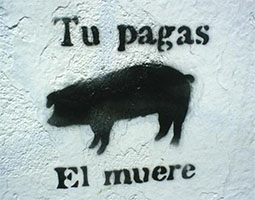 The dictionary of the Royal Spanish Academy ( RAE ) does not include the term speciesism , although this concept is frequently used to refer to an interaction between humans and another species that is harmful to the latter . Speciesism, in this framework, implies placing the needs of man above those of the rest of living beings.
The dictionary of the Royal Spanish Academy ( RAE ) does not include the term speciesism , although this concept is frequently used to refer to an interaction between humans and another species that is harmful to the latter . Speciesism, in this framework, implies placing the needs of man above those of the rest of living beings.
The English philosopher and psychologist Richard D. Ryder was the one who coined this notion in the early 1970s . According to Ryder , speciesism is a moral discrimination that is based on the difference of species . Stephen Clark , Peter Singer, and other authors later delved into this idea.
Speciesism assumes that people act on animals without ethical qualms, since they are placed in a position of superiority . Being inferior, according to this position, animals do not deserve respect or consideration when their exploitation generates some benefit for humans.
With speciesism, the life of the animal is at the service of man . According to activists who denounce this movement as immoral, speciesism appears in multiple spheres of daily life, such as food (since millions of animals are slaughtered every day to turn them into food), clothing (in the coats of skin, leather clothing), entertainment (animals used in circuses, bullfights, film shootings, etc.) and even scientific research (when experiments are carried out with them).
Among those who fight speciesism, there are two main currents. On the one hand, some sectors accept the "use" of animals in certain contexts, but demand dignified treatment . Other groups, however, demand an end to all types of animal exploitation , promoting veganism and other behaviors .
 The first current is often accused of being hypocritical, since equality cannot be defended by accepting exploitation , nor can the latter be disguised as "necessary use" just because it does not include obvious physical abuse, since there is always a psychological one that is impossible to ignore. . Getting any living being, of any species, to do something against its own will is wrong; No one should be subjected to the authority of another, much less for purposes such as livestock farming or scientific research.
The first current is often accused of being hypocritical, since equality cannot be defended by accepting exploitation , nor can the latter be disguised as "necessary use" just because it does not include obvious physical abuse, since there is always a psychological one that is impossible to ignore. . Getting any living being, of any species, to do something against its own will is wrong; No one should be subjected to the authority of another, much less for purposes such as livestock farming or scientific research.
Veganism also has many facets, not all of them coherent with the others. For example, most vegans support the sterilization of animals, something that is also not in accordance with their freedom. Of course, they defend this imposition, claiming that in this way they prevent uncontrolled reproduction, which usually ends in the abandonment of millions of animals. The objective may be noble, but forcing a living being to undergo a surgical operation, not so much.
Therefore, if we look for the ideal of fighting against speciesism, we should find those people who base their diet and clothing on products that are not of animal origin , just as veganism proposes, but who respect all individuals equally, and This includes not subjecting anyone to surgery, regardless of the underlying reason.
The attitude that characterizes speciesism is certainly unpleasant and very dangerous, as it feeds us with twisted and undeserved power , putting us above hundreds of species that most of us have never seen up close. We believe we are more intelligent and have more rights than whales, eagles, horses, dogs and cats, only because this idea is instilled in us from birth and we do not question it. We accept without hesitation that they crowd and slaughter millions of animals to turn them into steaks and leather boots, but the mere possibility that they use humans in their place turns our stomach.
